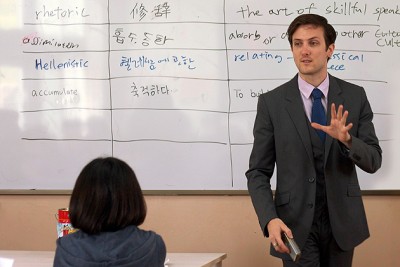
During my final year at UConn, my passion for travel and foreign cultures led me to seek a teaching position abroad. With a 12-hour time difference, a history steeped in mystery and legend, and a written language based on thousands of characters, the Peopleʼs Republic of China was about as far away as I could go.
Currently, I teach English and history at the international division of Shanghai High School, one of the most prestigious schools in the country. Although about 40 percent of the staff are foreign teachers like me, and courses based on an international curriculum are offered, it is still very much a ʻChineseʼ school: There is a heavy emphasis on testing and teacher-centered instruction. The hard sciences are favored over subjects like history. Change occurs slowly. Suggested improvements must be made subtly and indirectly before passing through a long bureaucratic process, a staple of Chinese society.
For someone passionate about social studies and who graduated from UConnʼs Neag School of Education – which offers one of Americaʼs premier education programs – these cultural differences present some major challenges. I came to China with the ʻnobleʼ intention of observing local culture and understanding it. This I have managed to do. However, Chinese culture manifests itself in my workplace as mentioned above, and though I understand it, I struggle to work effectively in its context on a day-to-day basis. On more than one occasion, I have left meetings fuming over a pedagogical disagreement I had with a Chinese teacher.
These challenges aside, the work experience is immensely rewarding. One of my best lessons was an interview project in my ninth-grade honors history class. I offered students an extra credit assignment to interview relatives who had lived under Chairman Mao (1945-76). The heart-wrenching stories they came back with blew me away. Just as I respected my grandparentsʼ generation for their hard work and struggles through the Great Depression and World War II, so do I now respect Chinaʼs “Greatest Generation.” Not only did they live through the Japanese invasion, they then survived starvation and epic purges at the hands of their own government.
Experiences outside my job have also contributed to my developing an unabashed pride for China. From sparking a conversation with locals to ordering food at a restaurant, I feel I grow as a person and learn things constantly, just by going through my daily routine!
Lastly, if you have not had a chance to try it, real Chinese food is amazing. Most takeout restaurants in America are not representative of authentic Chinese cuisine, and the dust found in Lipton tea sachets is not tea. The variety of dishes and broad spectrum of flavors and colors is enough to satisfy even the most discriminating of foodies. My favorite dish is Shanghaiʼs most famous dumpling called xiaolongbao, a juicy morsel of seasoned pork wrapped in a delicate piece of dough, steamed to perfection. The teas are so delicious you never need to mask their flavor with milk, lemon, or sugar. The leaves can be infused sometimes as many as a dozen times without losing flavor!
The Peopleʼs Republic of China is larger than the continental U.S. and contains hundreds of ethnic groups, each of which has their own language and customs. The rich history and challenging work environment have inspired me to sign on for a third year.
Nicholas Banas ʼ10 (ED, CLAS), ʼ10 MA grew up in Mystic, Conn., but has been living in Shanghai, China, since fall 2010. He teaches AP World History, Ancient Civilizations, Honors 20th-century History, and English as a Foreign Language to students in 9th through 12th grade. His website, nicholasbanas.com, includes a blog about life in China.
 Facebook
Facebook
 Twitter
Twitter
 LinkedIn
LinkedIn
